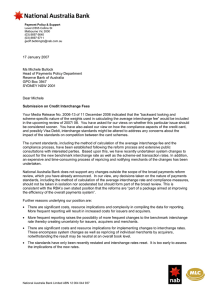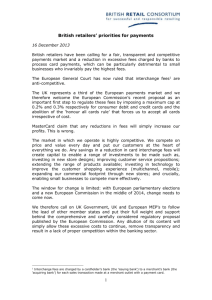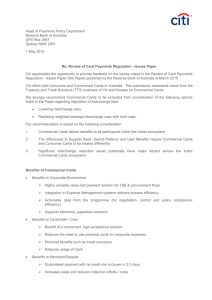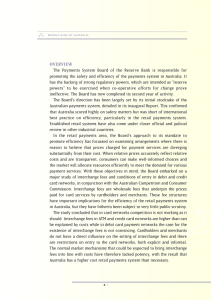Head of Payments Policy Department Reserve Bank of Australia GPO Box 3947
advertisement
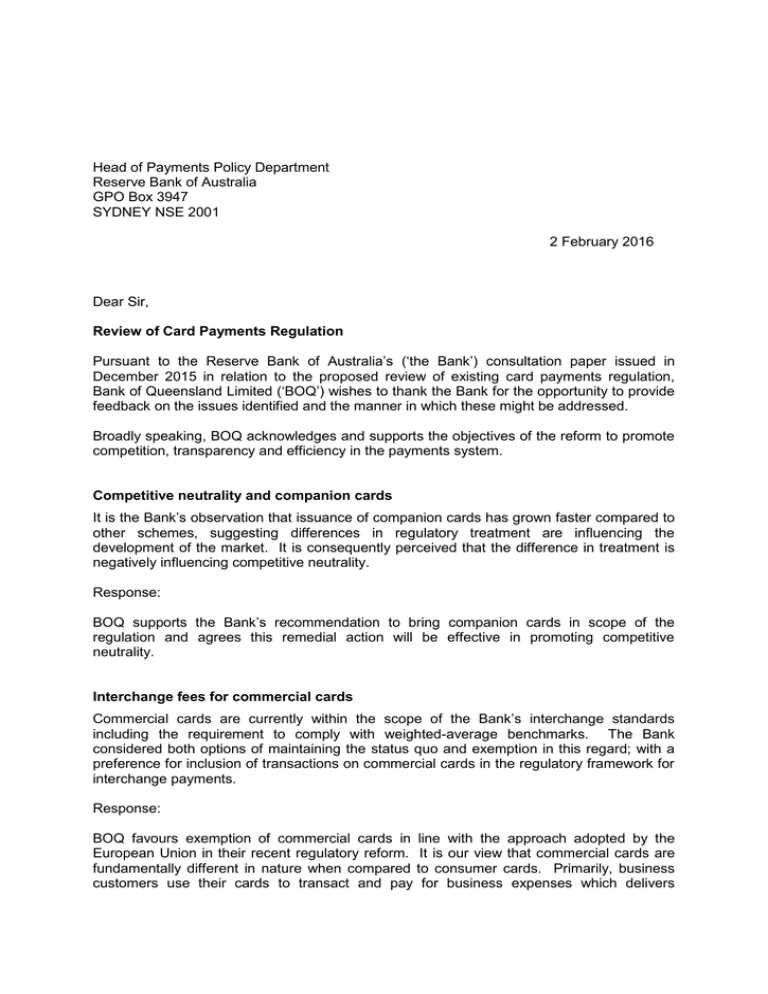
Head of Payments Policy Department Reserve Bank of Australia GPO Box 3947 SYDNEY NSE 2001 2 February 2016 Dear Sir, Review of Card Payments Regulation Pursuant to the Reserve Bank of Australia’s (‘the Bank’) consultation paper issued in December 2015 in relation to the proposed review of existing card payments regulation, Bank of Queensland Limited (‘BOQ’) wishes to thank the Bank for the opportunity to provide feedback on the issues identified and the manner in which these might be addressed. Broadly speaking, BOQ acknowledges and supports the objectives of the reform to promote competition, transparency and efficiency in the payments system. Competitive neutrality and companion cards It is the Bank’s observation that issuance of companion cards has grown faster compared to other schemes, suggesting differences in regulatory treatment are influencing the development of the market. It is consequently perceived that the difference in treatment is negatively influencing competitive neutrality. Response: BOQ supports the Bank’s recommendation to bring companion cards in scope of the regulation and agrees this remedial action will be effective in promoting competitive neutrality. Interchange fees for commercial cards Commercial cards are currently within the scope of the Bank’s interchange standards including the requirement to comply with weighted-average benchmarks. The Bank considered both options of maintaining the status quo and exemption in this regard; with a preference for inclusion of transactions on commercial cards in the regulatory framework for interchange payments. Response: BOQ favours exemption of commercial cards in line with the approach adopted by the European Union in their recent regulatory reform. It is our view that commercial cards are fundamentally different in nature when compared to consumer cards. Primarily, business customers use their cards to transact and pay for business expenses which delivers considerable working capital, fraud protection through chargeback rights and productivity benefits such as timely receipt of cleared funds, limited cash handling, etc. From an issuer perspective, the value of transaction processing is higher, which increases the cost of funding with a lower propensity to revolve on a commercial book. Higher transaction values also result in higher capital requirements given the risk weighting of the asset for capital purposes and the requirement to hold capital on the average daily balance, with notably lower interest income. A commercial card portfolio is more customised in comparison to consumer card portfolios with features such as unauthorised transaction insurance, restricted access cards, enhanced statements and reporting. Commercial cards should be excluded from the regulation in order to maintain these niched offerings. BOQ holds the view that the commercial card market in Australia is immature and requires further investment from both an acquiring and issuing perspective, including but not limited to investment in the mobile payments. Reducing interchange income on these products is likely to cause a flow on affect to investment in these products, leading to less spend on innovation and limiting potential payment efficiencies. Foreign-issued cards acquired in Australia The standards currently apply to transactions on Australian-issued cards acquired domestically and do not extend to transactions acquired domestically on foreign-issued cards. The Bank suggested that foreign-issued cards should be treated similarly to domestically issued cards when used in Australia, given the potential for circumvention of interchange regulation. Response: BOQ supports preserving the current treatment of foreign transactions acquired domestically. We believe circumvention is unlikely and have confidence in self-regulation by domestic issuers in this regard. Costs to schemes from any such change would not be insignificant and such costs passed on through the participants in the four party scheme are ultimately borne by the consumer. BOQ wishes to express concerns that a change of this nature may result in unintended cross border reciprocity, an outcome which domestic issuers will have limited influence over. Such reciprocity will likely negatively influence the commerciality of card programs in the long term. Benchmark Compliance The current compliance mechanism has seen average interchange fees remain above the benchmarks and also drift higher over the course of the three-year compliance cycle. In an effort to normalise the observed ‘sawtooth’ pattern of weighted-average interchange fees, the Bank is proposing benchmark compliance reviews on a quarterly basis. Response: BOQ supports more frequent benchmark compliance however believes a quarterly review will not cater for seasonality that exists in spend patters. Such seasonality may see significant swings from one quarter to the next. Consequently, BOQ is in favour of an annual reset cycle or a quarterly review cycle which considers the weighted-average of the preceding 12 months. Interchange Benchmarks and Ceilings The interchange benchmarks set by the Board are the primary instrument for the Bank to achieve interchange fees at a desired level. The current benchmarks of 0.50 per cent of the value of credit card transactions and 12 cents per debit card transaction have been in place since 2006. Given the presiding structure of interchange, higher interchange rates tend to be borne disproportionately by smaller and medium-sized businesses, most of which do not benefit from the ‘strategic’ or preferential rates available to larger merchants. The Bank has proposed maintaining the current weighted average of 0.50 per cent while introducing a ceiling of 0.80 in respect of credit cards; a reduction in the benchmark to 8 cents in the case of debit. Response: The interchange cap of 0.80 on credit cards will have a significant impact on the product offering for premium portfolios. Once the interchange cap is finalised by the Bank it will take some time for the schemes to determine how best to adjust their current interchange models so as to maintain the 0.50 average while still providing value for premium cards. Currently premium cards earn a high interchange and pass a significant amount of this onto clients in rewards points. As such the issuers will need to understand the scheme changes and review how best to update their card programs. This will have a potentially significant client impact and will require issuers to provide adequate notice to clients. As a result of the above it is our view that any implementation of the above changes should not occur until the beginning of the 2nd Quarter 2017. This will allow time for schemes to update the interchange models, issuers to review and adjust their product propositions, renegotiate legal agreements, make any required system changes and communicate changes to clients appropriately. Scheme Payments/Incentives to Issuers In addition to interchange payments from acquirers to issuers, schemes make further payments in the form of marketing and incentive payments. These are typically negotiated bilaterally and may be material in value. The flexibility of such payments means that they can potentially be structured in ways to circumvent interchange regulation. Response: Payments of this nature are intended to support technology changes, assist in the cost of introducing new products to market and marketing activities. Such payments have not been applied for purposes other than which they were intended and have operated on a cost recovery basis rather than contributing to income. BOQ re-iterates our confidence in selfregulation by domestic issuers and consequently supports maintaining the status quo with respect to incentive payments. Surcharging The Bank’s objective to enable transparent and fair price signals to consumers and merchants is equitable. The objective can be facilitated by providing merchants with the ability to recover acquiring costs by means of surcharging and to protect consumers from excessive surcharging. Response: BOQ supports the Bank’s proposal for modifications to the cost of acceptance framework. BOQ would like the Bank to consider the complexity of changes to achieve disclosure to merchants and afford acquirers adequate time to implement such changes, giving due thought to other significant industry initiatives already underway. On the topic of taxi industry, BOQ has a preference for the Bank to define the average cost of acceptance in line with other merchants and apply regulation to all merchant categories under a single regulatory framework. BOQ wishes to thank the Bank for the opportunity to participate in this consultation. Please don’t hesitate to contact us should you require any further information. Yours sincerely, Joanne Henaghan Head of Payments, Merchants, Cards Carla Peters Senior Manager Regulatory Affairs
